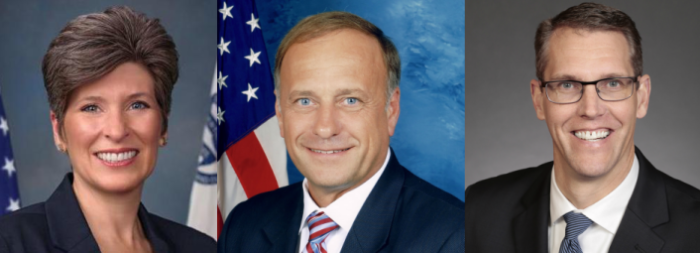U.S. Senator Joni Ernst made headlines in Iowa and national media this week when she told reporters on a conference call she “will not be endorsing anyone” for the Republican nomination in the fourth Congressional district.
Strictly speaking, her announcement wasn’t news. Within days of State Senator Randy Feenstra’s campaign launch in January, Ernst said she didn’t plan to endorse in the IA-04 primary, Bret Hayworth reported for the Sioux City Journal at the time.
Many commentators have viewed Ernst’s distancing as a political blow to King, whom she enthusiastically endorsed the first time he faced a GOP primary challenger. Similarly, Governor Kim Reynolds and Senator Chuck Grassley backed King in that 2016 race but have vowed to stay neutral before next June’s primary.
While King would surely welcome the backing of Republican heavyweights for what may be the toughest race of his career, Feenstra likely needs that boost more.
King’s diehard supporters and I could hardly see the political world more differently, but I’d guess we agree on one thing: Ernst didn’t abandon the incumbent as a matter of principle. King has never hidden his views on race, immigration, and the supposed superiority of (white) western civilization. Like then-Governor Terry Branstad said in a radio ad he recorded for King in 2012: “Outspoken? You bet, and I like that. We know where Steve King stands.”
King’s highlight reel of offensive statements was already long when Ernst filmed a video supporting his candidacy in April 2016. Ernst embraced King and gave him a flattering introduction shortly before last November’s election. Less than two weeks earlier, the National Republican Congressional Committee chair had repudiated King amid yet another national firestorm (this time over an interview to an Austrian website associated with neo-Nazis).
Ernst was quick to pile on after the New York Times published Trip Gabriel’s interview with King in January.
I condemn Rep. Steve King’s comments on white supremacy; they are offensive and racist – and not representative of our state of Iowa. We are a great nation and this divisiveness is hurting everyone. We cannot continue down this path if we want to continue to be a great nation.
— Joni Ernst (@SenJoniErnst) January 12, 2019
But when King made national news in 2017 by saying, “We can’t restore our civilization with somebody else’s babies,” Iowa’s junior senator said mildly that she didn’t “condone his language.” Pressed on whether she would “publicly admonish” King at that time, Ernst hid behind a written statement that staff didn’t even post on her official website.
Whether you love King or loathe him, everyone can spot the craven political calculation here. Ernst couldn’t be bothered to take a stand against King’s racism until he nearly lost an election in an R+11 Congressional district. The senator will need votes from a lot of moderate Iowans to be re-elected in 2020. But she also will need support from Republican loyalists who stand by King. Hence her pledge to stay out of the IA-04 primary.
Look at this situation from Feenstra’s perspective. Although he’s out-raised King so far and landed some helpful endorsements, he’s still facing an uphill battle against an entrenched incumbent. King’s got a deep reservoir of support among Republicans who will sympathize with his narrative as a victim of a “political lynch mob.” He’s been holding town halls across the district, portraying himself as a brave truth-teller ostracized by the corrupt GOP establishment.
Feenstra could use help from powerful Republicans like Reynolds, Grassley, and Ernst in persuading conservative voters to fire King and hire someone else. But Ernst won’t have the guts to do that. She may end up sharing a ballot with King in 39 counties next November and can’t afford to alienate his supporters.
Ernst’s positioning on King looks like a bid to save her own skin, rather than a case for electing a different kind of Republican in the fourth district.
P.S.- If Ernst were genuinely concerned about exacerbating racial divisions in this country, she wouldn’t have gone down to Mississippi last November to campaign for a woman who had joked about public hangings.

